
African scholars have been called upon to devise strategies for the return of Africa's migrated archives from the West. In a keynote address at the 2024 Archiving, Memory, and Method from the Global South International Conference, Professor Nathan Mnjama of the University of Botswana emphasized the limited success of ongoing efforts and criticized Western proposals to return only digitized versions of the archives, urging the return of original materials.
The three-day conference, organized by Makerere University’s College of Humanities and Social Sciences (CHUSS) in collaboration with the Mellon Foundation, marked the conclusion of a three-year project examining the relationship between archives, communities, and academia in the Global South. Prof. Mnjama shared his professional journey and highlighted the need for continued efforts to successfully reclaim Africa's historical records.
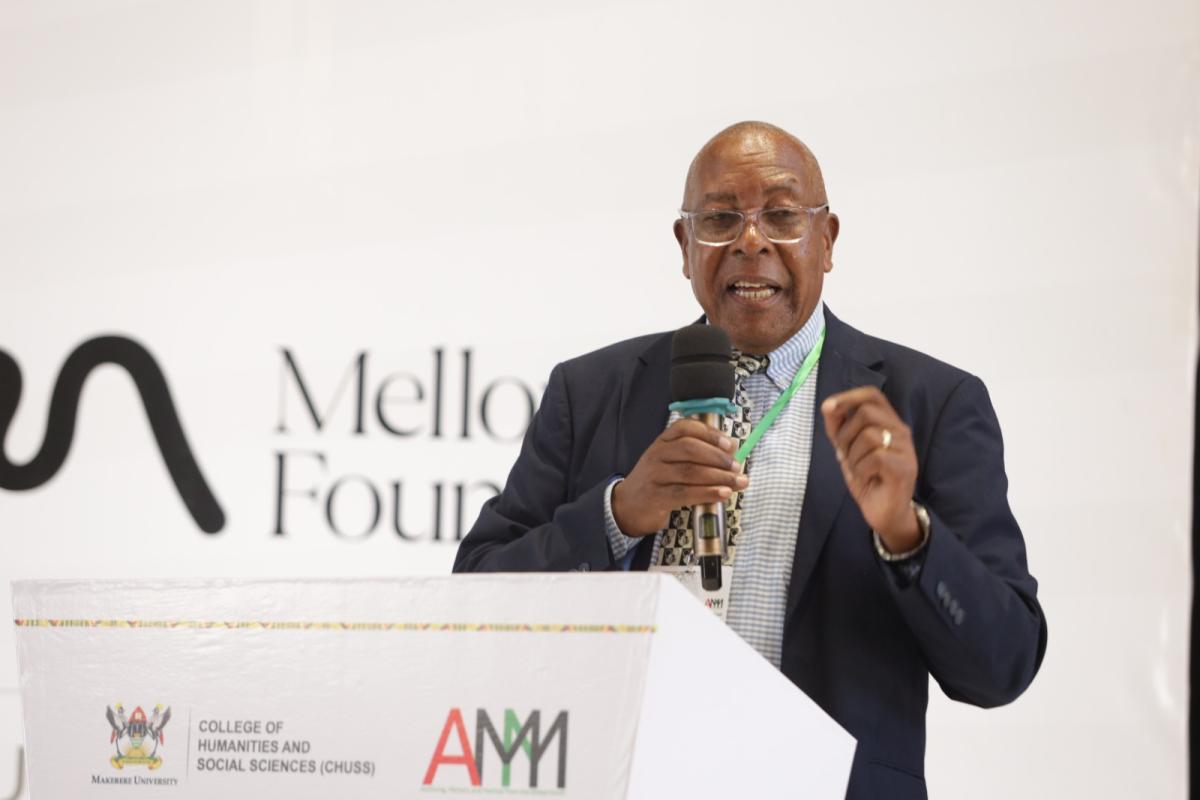
During his address, Prof. Mnjama reflected on his longstanding interest in archives throughout his career. He began as a historian at the University of Nairobi, aspiring to become a history professor, but his path changed when he was introduced to the National Archives of Kenya by his professors. He recalled his early attempts to find records related to his community during World War I when many families were uprooted as a punishment for hosting a German spy. Despite his efforts, he found that many crucial records had gone missing.
Prof. Mnjama described how, during his studies, he became intrigued by the fate of these records. His interest deepened when he discovered that certain records related to political associations in his district had also vanished, having been confiscated during periods of political turmoil. After a brief tenure at the National Archives, he pursued postgraduate studies at the University of Ghana, where he and his colleagues undertook a survey of Kenyan records held in the UK. This led to further inquiries about records taken to the US, where they assessed the materials held by various African institutions.
He pointed out that migrated archives are records that have left their place of origin, emphasizing the distinction between those that were created in Britain by colonial administrators and those that were physically airlifted from Africa to Europe during the transition to independence. He explained that the British colonial administration took measures to remove certain records to protect their interests as independence approached. Prof. Mnjama noted that, in Kenya alone, over 1,500 files were removed, and many were destroyed in bonfires, ensuring that sensitive information would not fall into the hands of the newly independent government.
He highlighted the challenges faced in recovering these records, noting that diplomatic channels often yielded little success. A landmark moment occurred in 2011 when Kenyan freedom fighters took legal action against Her Majesty's government, resulting in the release of some records and compensation for the victims of colonial atrocities. However, he emphasized that no compensation could truly reflect the suffering endured by those individuals.
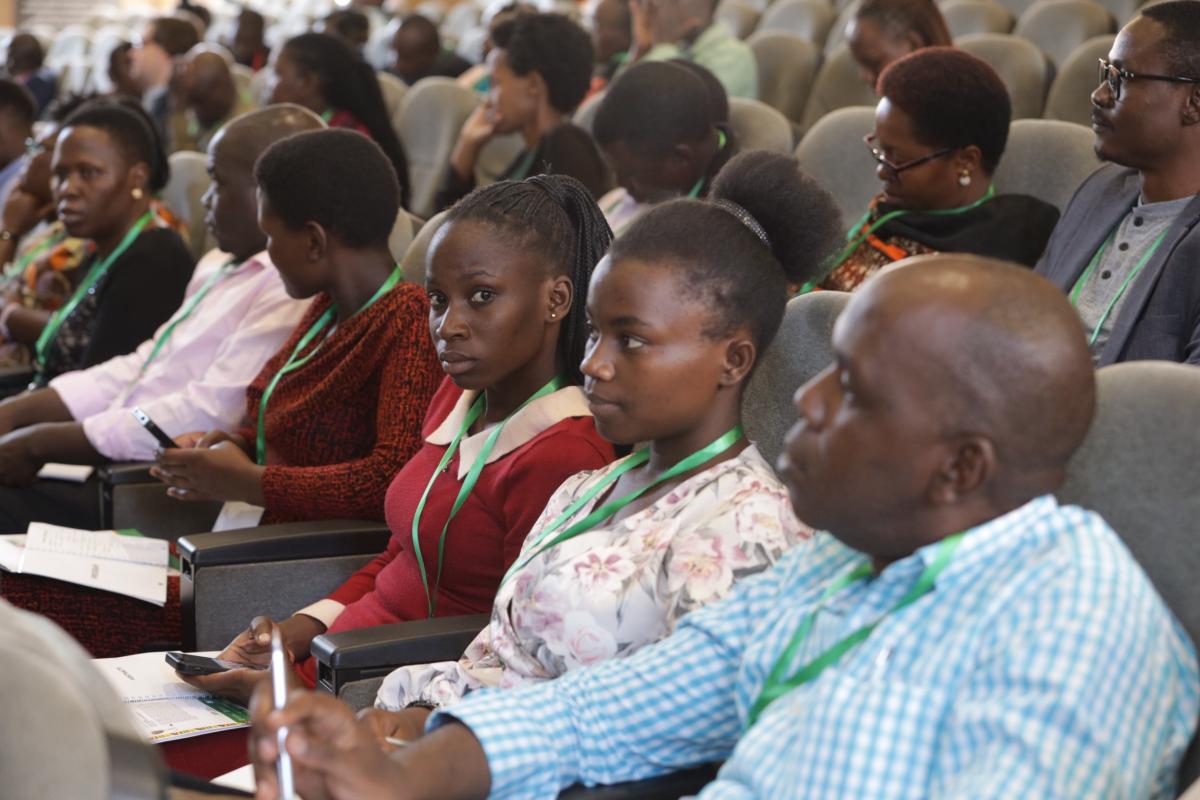
Additionally, he discussed the complexities surrounding records that belonged to former federal institutions, which were shared across East Africa. Many records from the East African Community, established in 1927, remain in Tanzania despite their relevance to Kenya and Uganda, underscoring the ongoing challenges of reclaiming these migrated archives. Prof. Mnjama's address highlighted the urgent need for African scholars to strategize effectively in the quest to return Africa's historical records from the West, emphasizing the importance of original materials over digital reproductions.
Prof. Mnjama discussed the historical context and ongoing efforts to reclaim migrated archives from Europe. He noted that during the 1980s, archivists from East Africa frequently traveled to the UK and Europe to locate these crucial records, often returning with little success due to limited access to archival catalogs and the short duration of their visits.
“Finding not much was accomplished through those surveys,” Prof. Mnjama reflected, highlighting the inefficacy of these early initiatives. He emphasized that despite spending years in the UK working on Kenya’s migrated archives, many records remain inaccessible, particularly those from the pre-independence era.
Prof. Mnjama pointed out the establishment of the Eastern and Southern African regional branch of the International Council on Archives (ESABICA) in 1969, which has passed multiple resolutions advocating for the return of these records. However, he lamented that "none of those have really come to any maturity," leaving many resolutions to gather dust.
He called attention to a 2003 recommendation by NEPAD for the African Union to form a joint committee to retrieve these records, stating, “Up to now, nothing much has been achieved.” The professor also highlighted a 1983 initiative to create a legal framework addressing issues of migrated archives, which was ultimately rejected by Western powers, stymieing efforts to recover important historical documents.
Prof. Mnjama shared successful case studies, including Kenya's publication of a comprehensive guide to colonial records and Namibia’s successful agreement with South Africa for the return of records. “Kenya’s story was a success story, but we only scratched the surface,” he remarked, emphasizing the need for ongoing efforts in this area.
He concluded by urging stakeholders to consider critical factors for successfully pursuing the return of migrated archives, including the significant costs involved, the complexities of locating materials across multiple institutions, and the necessity of understanding the legal frameworks in host countries. "Locating our archives held elsewhere is a major task. It's expensive," he noted.
Vice Chancellor’s Remarks: Prof. Arinaitwe Advocates for Robust Archiving Practices and Cultural Preservation
While officially opening the conference on behalf of the Vice Chancellor, the DVC FA Associate Professor Henry Arinaitwe, emphasized the urgent need for effective preservation of historical documents and records.
Recognizing various dignitaries, including council members and fellow vice chancellors, as well as distinguished scholars from South Africa and Botswana, Arinaitwe highlighted the significance of collaboration in addressing archival challenges. He reflected on the devastating fire that engulfed Makerere University’s main building in 2020, which resulted in the loss of numerous historical documents. “This incident raised concerns about the loss of our history,” he stated, reassuring attendees that all student records remained safe and that most lost documents had already been digitized or duplicated.
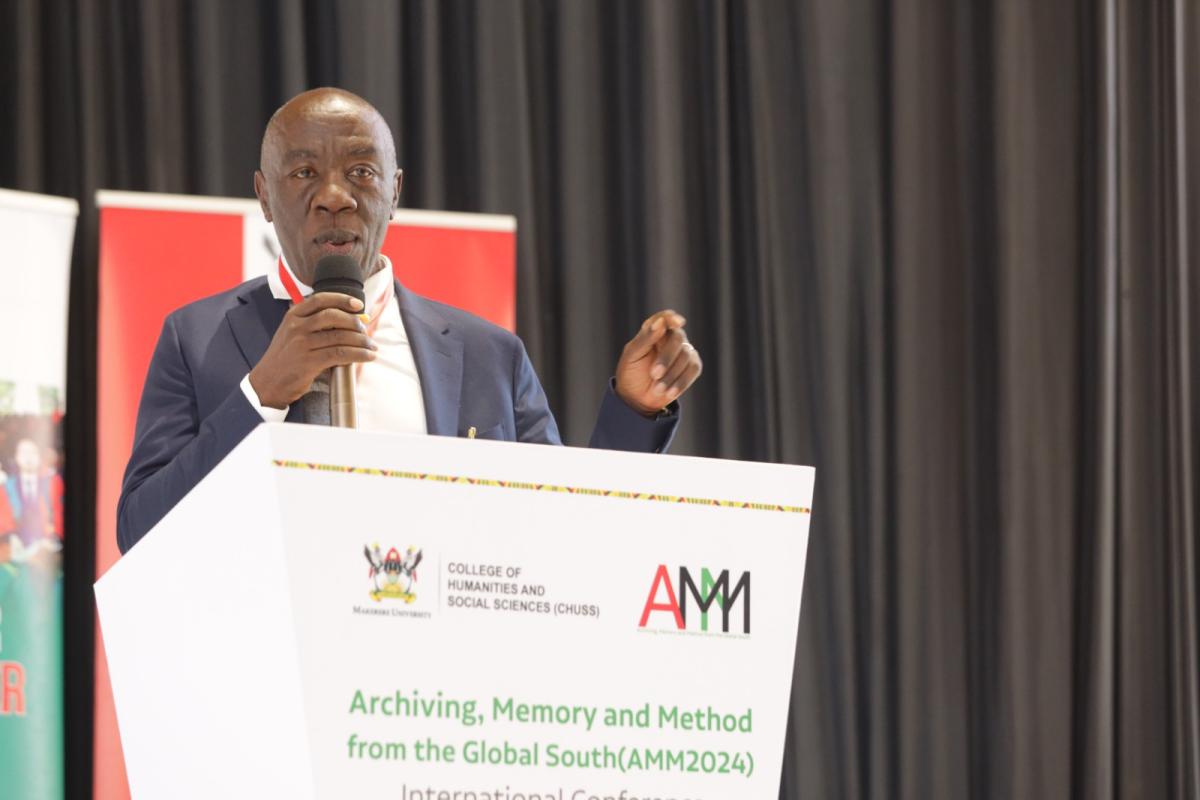
Arinaitwe urged the audience to reconsider their archiving methods, emphasizing, “We must ensure that we preserve our documents to prevent future losses.” He pointed out the complications arising from Uganda’s increasing number of geographical districts, which have surged from 16 to over 100. This division, he noted, often leads to territorial disputes, highlighting the archives’ crucial role in resolving such conflicts. “Most of these disputes have been resolved following the archives in London,” he remarked.
Addressing the threats posed to archives by natural disasters, Arinaitwe warned, “In situations where natural disasters strike, entire histories can be lost,” reinforcing the need for robust preservation strategies at both institutional and familial levels.
He expressed gratitude to the College of Humanities and Social Sciences for their dedication to redefining the importance of archives in shaping narratives and identities. “This event is more than just an academic exercise—it’s a chance for us to explore themes that touch on our shared histories and how we envision our futures,” he said.
Arinaitwe further elucidated the dynamic role of archives, noting that they should not be viewed merely as repositories of the past but as essential components in understanding power dynamics and facilitating reconciliation, especially in the Global South, where historical narratives have often been marginalized. “Through the documentation of oral histories, folklore, music, and language, we have ensured that these vital aspects of our culture will be passed on to future generations,” he remarked.
Emphasizing the project’s inclusive approach, Arinaitwe highlighted the involvement of local communities in preserving and interpreting archives. “This approach ensures that voices that have traditionally been left out are now part of the story,” he noted, underscoring the university’s commitment to national development.
The Vice Chancellor also spoke about the project's investment in the future of archival studies, stating, “By equipping the next generation with the tools to carry this work forward, we’re ensuring that the field of archival studies continues to thrive at Makerere.”
As the conference unfolds, discussions will focus on the role of archives in reconciliation, justice, and the preservation of endangered cultural traditions, with scholars addressing gaps in historical records concerning marginalized groups. Arinaitwe encouraged participants to actively engage in discussions that bridge the past and the future, concluding with gratitude for the Mellon Foundation’s support. “Let this be a space for collaboration, reflection, and innovation as we work together to bridge the past and the future,” he said.
Celebrating Heritage and Memory: Prof. Nkabala Highlights the Importance of Archives at CHUSS Conference
In her opening remarks, Prof. Nkabala expressed gratitude to her predecessor, Professor Josephine Ahikire acknowledging her focused leadership that has enabled CHUSS to excel
Prof. Nkabala welcomed all attendees and celebrated the team behind the conference, which included convenors, researchers, students, and research assistants. She recognized those involved in the project , highlighting the collective effort that brought the conference to fruition.
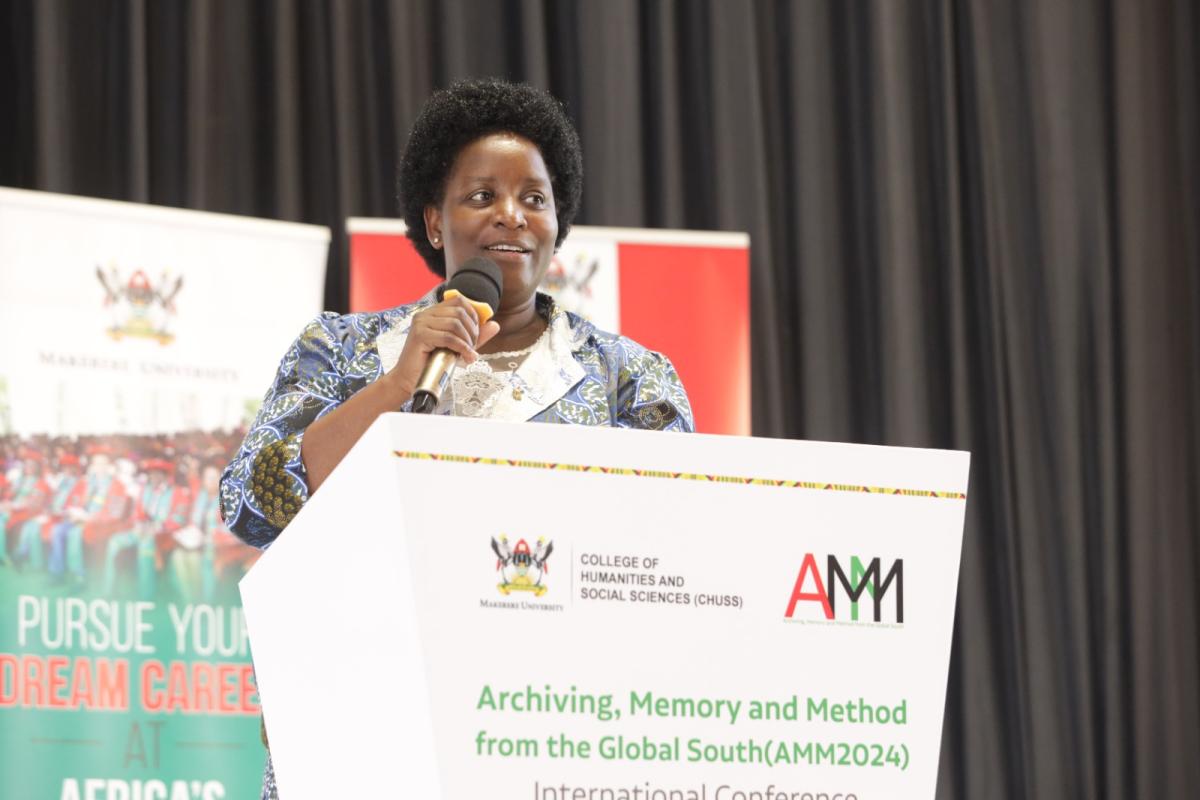
The Principal noted that the conference marks the culmination of a project that deeply explores the relationship between archives, memory, and knowledge production, particularly focusing on the unique experiences from the Global South. “Matters of archives and memory are very dear to us as the humanities because we know they form the basis and the core of our very existence,” she stated.
Prof. Nkabala emphasized the significance of the project, which aims to amplify the voices of marginalized communities. She noted that the initiative provides an opportunity to write and reclaim histories often overlooked or distorted. “This project sought to bring to reality and amplify voices of those silenced and overlooked,” she asserted.
Highlighting the relevance of the conference, Prof. Nkabala stated, “The conference is not just the culmination of our efforts but an opportunity for us to engage in rich dialogue with a global community of scholars and practitioners.” She celebrated the diverse array of topics to be explored, including the role of archives in promoting accountability and the preservation of endangered languages and traditional music.
“The discussions are vital because they remind us of the power that archives hold in shaping our collective memory and understanding of the world,” she emphasized, reiterating that archives are not mere repositories of information but living spaces where knowledge is created and contested.
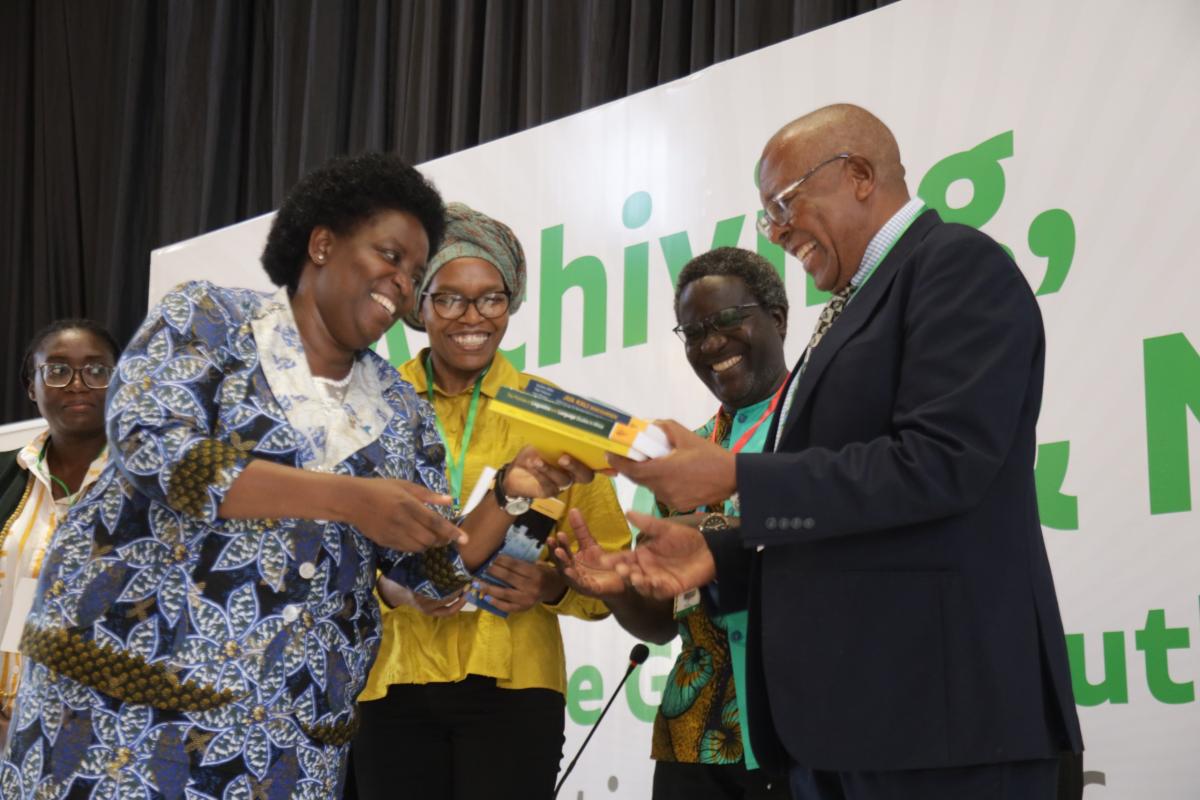
Prof. Nkabala reflected on the growing calls for proper archiving of national history, particularly in light of recent events, including the reopening of a significant building by the President of Uganda. She referenced the works of scholars such as Francis Baldwin and Jones-Mason, who emphasize the need for a nuanced understanding of memory and history in archival practices.
Looking ahead, she expressed optimism that the conversations initiated at the conference would extend beyond the event. “I am extremely optimistic that the conversations that we begin today will continue for a long time,” she said, recalling the foundational ideas introduced by Franz Fanon in 1961 regarding history and memory.
Prof. Nkabala expressed her gratitude to the Mellon Foundation, project collaborators, and all participants for their involvement. “I encourage all of us to make the most out of the sessions and forge new connections that will extend the impact of this very important work,” she urged.
Conference Highlights Importance of Archival Research in African Identity; Principal Investigator Prof. Josephine Ahikire
Prof. Josephine Ahikire, Principal Investigator of the project on archival research, opened the conference with a call to revitalize history as a central discipline in African identity.
“Three years ago, we embarked on a journey to revamp history and revive archival research as a cornerstone of our identity as Africans,” Ahikire stated, emphasizing the necessity of collaborative work to achieve this goal. “If we are serious about our history, we must also engage in archival research. This dream required us to learn from each other, paving a path towards collective knowledge production.”
Prof. Ahikire acknowledged the support of various individuals, including the head of the Department of History, Archaeology, and Heritage Studies, who convened the conference. She also recognized the Vice-Chancellor, Professor Barnabas Nawangwe, represented by DVC Finance and Administration, Professor Henry Arinaitwe, for gracing this conference.
Highlighting the decentralized nature of the project, she noted, “As Principal Investigator, I was reading from the back seat, more of learning than actually leading. The leadership and writings have been so decentralized that the locus of knowledge is collective.”
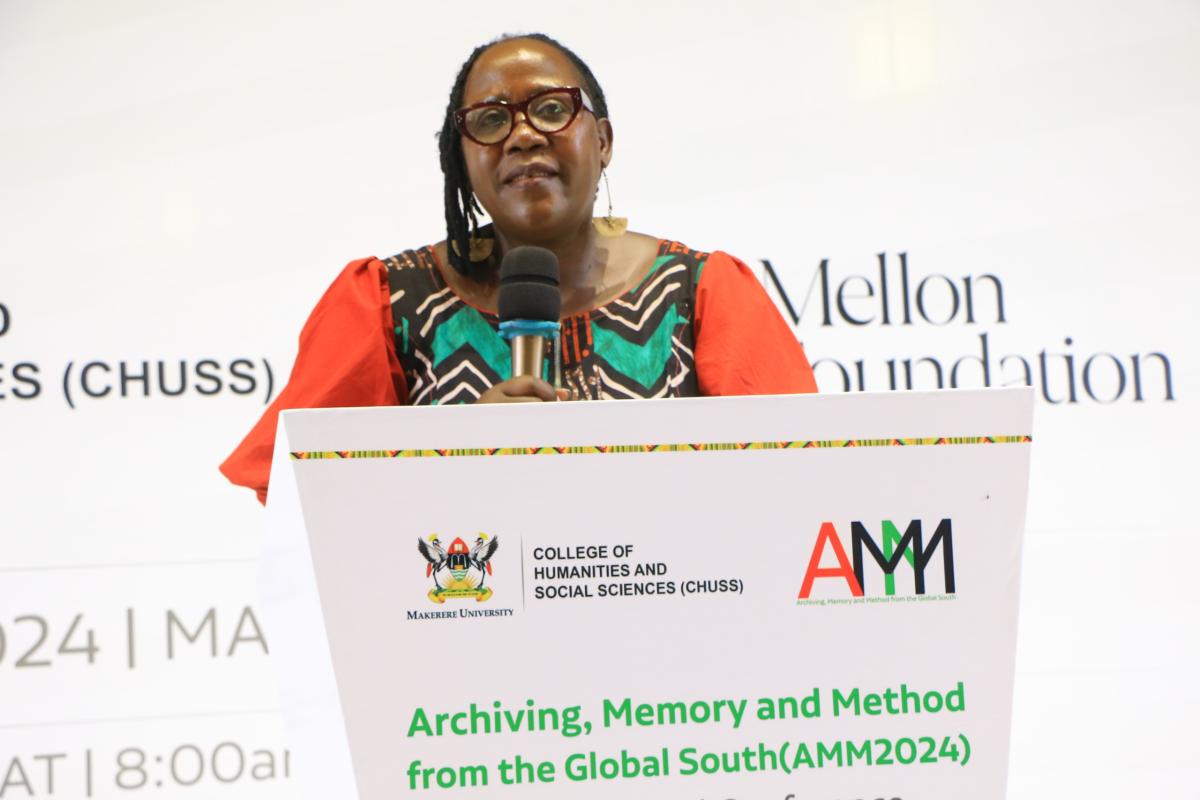
Ahikire further explored the concept of archives, asserting that they serve as not just physical spaces but also as political spaces crucial for restoring knowledge and history. “We have been talking about archiving as a political project in terms of restoring knowledge and being able to own some of the debates and discussions,” she explained.
Addressing the importance of engaging students, Ahikire remarked, “We believe that the neoliberal heterodoxy we have endured for the last three decades has not left us the same. We must engage in a restoration project to reclaim our identity and heritage.”
Reflecting on her initial experiences with archival research, she recalled, “The first day I visited the archives, I found them dusty and disorganized. I couldn’t find what I wanted, which was the history of labor in East Africa. I never went back. I learned that methodology is essential in this process, and archives are more than physical spaces; they are also political spaces.”
In closing, Ahikire expressed gratitude to the college leadership for supporting the conference and emphasized a commitment to continue the intellectual agenda. “We promise to make this project bigger and better,” she affirmed, highlighting the importance of peer learning as they move forward.
Conference Convener Dr. Charlotte Mafumbo Emphasizes Cultural Preservation and Collaboration
Dr. Charlotte Mafumbo, the conference convenor, opened the event with an inspiring message about the importance of taking the first step in any long journey.
“Every long journey starts with one step!” Mafumbo declared, reflecting on the rewarding experience of preparing for the conference. She expressed deep gratitude to the Mellon Foundation and the Project Leader, Prof. Josephine Ahikire, for their unwavering support and guidance, stating, “Your commitment has brought us this far.”
Acknowledging the collaborative efforts of the project management team, she specifically thanked project coordinators and other members for their extensive support. “I would also like to express my gratitude to the Principal, the University Management, and especially the DVC AA and VC for setting a precedent for developing research as a central element of any innovation and academic undertaking,” she added.
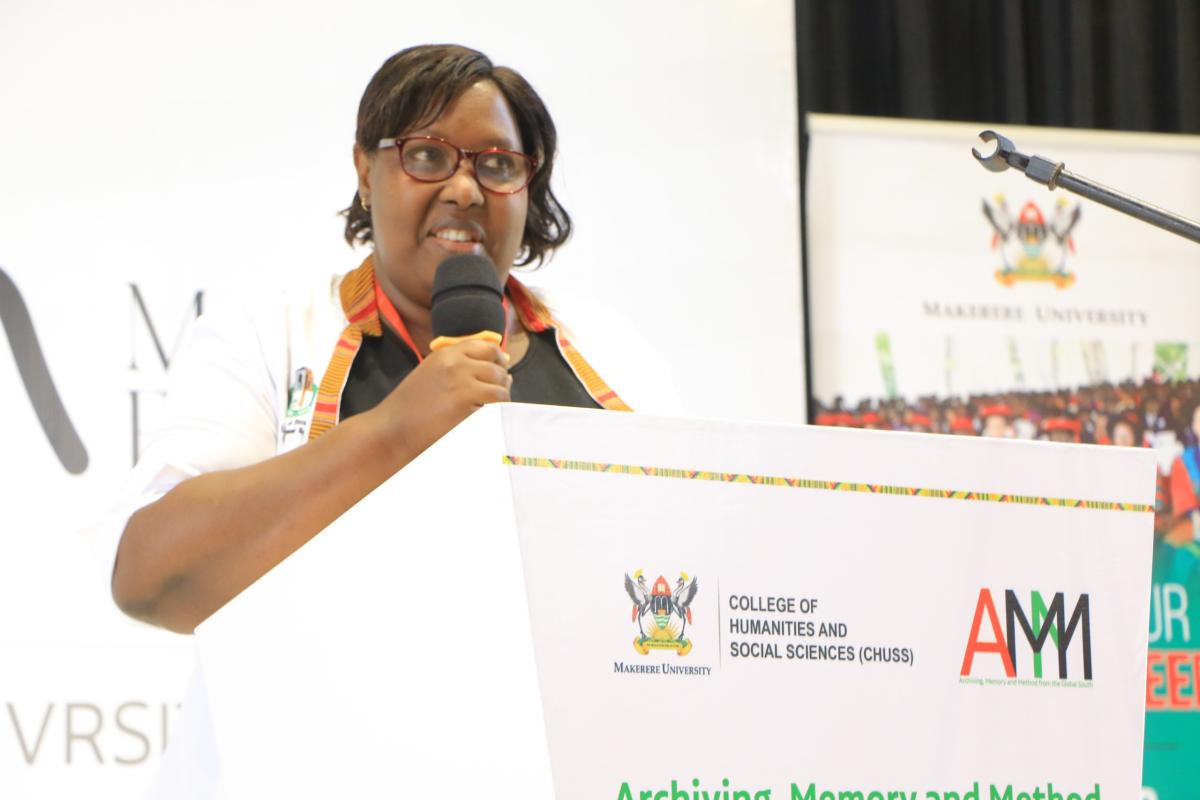
Mafumbo praised her incredible team, acknowledging the various committees that contributed to the conference's success. “I was fortunate to work with an amazing group, including the Academic and Scientific Committee led by EdgarTylor, the Welfare Committee led by Eve Nabulya, the Security and Logistics Committee and the Exhibition Committee led by Esther N. The secretariat, including Esther and Dancan, has been impeccable in guiding, programming, and managing the conference.”
Through the conference, Mafumbo reiterated a commitment to preventing the loss of culture and ensuring the preservation and management of archives, museums, and heritage sites. “The papers, panels, and roundtables will express our dedication to protecting our heritage and establishing museums, as well as enforcing archives, whether they are institutional, family, or community archives,” she stated. “I cannot emphasize enough how these are vital to our identity, culture, and norms.”
As she concluded her remarks, Mafumbo called for continued protection of archives, underscoring their role in safeguarding primary sources of truth. “These archives are critical to preserving our history in its purest form,” she noted.
“I hope our critical reflections here will strengthen and encourage each of us in preserving our archaeology, archives, memories, cultural heritage, and history,” she added.
In her earnest prayer, Mafumbo expressed hope that the ideas, opinions, and experiences shared throughout the conference would bear fruit in various facets of social, academic, political, and economic life. “Wishing you all successful deliberations,” she concluded.
